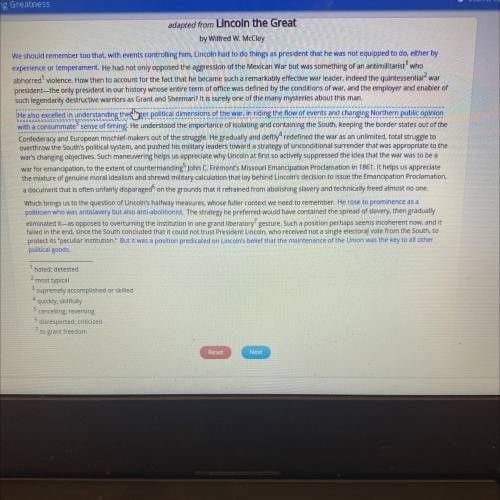
English, 20.10.2021 09:20 aaburto1515
Adapted from Lincoln the Great
by Wilfred W. McClay
We should remember too that, with events controlling him, Lincoln had to do things as president that he was not equipped to do, either by
experience or temperament. He had not only opposed the aggression of the Mexican War but was something of an antimilitarist' who
abhorred' violence. How then to account for the fact that he became such a remarkably effective war leader, indeed the quintessential war
president-the only president in our history whose entire term of office was defined by the conditions of war, and the employer and enabler of
such legendarily destructive warriors as Grant and Sherman? It is surely one of the many mysteries about this man.
He also excelled in understanding the larger political dimensions of the war, in riding the flow of events and changing Northern public opinion
with a consummate sense of timing. He understood the importance of isolating and containing the South, keeping the border states out of the
Confederacy and European mischief-makers out of the struggle. He gradually and deftly redefined the war as an unlimited, total struggle to
overthrow the South's political system, and pushed his military leaders toward a strategy of unconditional surrender that was appropriate to the
war's changing objectives. Such maneuvering helps us appreciate why Lincoln at first so actively suppressed the idea that the war was to be a
war for emancipation, to the extent of countermanding John C. Fremont's Missouri Emancipation Proclamation in 1861. It helps us appreciate
the mixture of genuine moral idealism and shrewd military calculation that lay behind Lincoln's decision to issue the Emancipation Proclamation,
a document that is often unfairly disparaged on the grounds that it refrained from abolishing slavery and technically freed almost no one.
Which brings us to the question of Lincoln's halfway measures, whose fuller context we need to remember. He rose to prominence as a
politician who was antislavery but also anti-abolitionist. The strategy he preferred would have contained the spread of slavery, then gradually
eliminated it-as opposed to overturning the institution in one grand liberatory' gesture. Such a position perhaps seems incoherent now, and it
failed in the end, since the South concluded that it could not trust President Lincoln, who received not a single electoral vote from the South, to
protect its "peculiar institution. But it was a position predicated on Lincoln's belief that the maintenance of the Union was the key to all other
political goods.
hated; detested
2 most typical
supremely accomplished or skilled
4 quickly, skillfully
5 cancelling reversing
disrespected, criticized


Answers: 2


Another question on English

English, 22.06.2019 01:40
Theme is question 26 options: the way the story is presented. overarching ideas that are presented in the story. the author�s message that he or she is communicating to readers. the way the story makes the reader feel.
Answers: 1

English, 22.06.2019 04:30
Read the following excerpt from the play a raisin in the sun by lorraine hansberry: johnson (this usa woman who decided long ago to be enthusiastic about everything in life and she is inclined to wave her wrist vigorously at the heigh of her exclamatory comments.): hello there, yourself! h’you this evening, ruth? which assumption about johnson is most likely true based on the stage direction? a. her enthusiasm is used to mask her fear of public places
Answers: 1

English, 22.06.2019 05:50
What idea-generating technique allows members to intentionally develop unconventional or outlandish ideas? brainstorming
Answers: 1

English, 22.06.2019 07:00
In a 10-12 sentence response-style paragraph, explore the degree to which you agree or disagree with faulkner’s message. “i believe that man will not merely endure: he will prevail. he is immortal, not because he alone among creatures has an inexhaustible voice, but because he has a soul, a spirit capable of compassion and sacrifice and endurance. the poet's, the writer's, duty is to write about these things. it is his privilege to man endure by lifting his heart, by reminding him of the courage and honor and hope and pride and compassion and pity and sacrifice which have been the glory of his past. the poet's voice need not merely be the record of man, it can be one of the props, the pillars to him endure and prevail” (faulkner 773-775).
Answers: 2
You know the right answer?
Adapted from Lincoln the Great
by Wilfred W. McClay
We should remember too that, with events...
We should remember too that, with events...
Questions

Geography, 05.10.2019 16:30


Computers and Technology, 05.10.2019 16:30


Mathematics, 05.10.2019 16:30

Mathematics, 05.10.2019 16:30


English, 05.10.2019 16:30




Biology, 05.10.2019 16:30

Mathematics, 05.10.2019 16:30


History, 05.10.2019 16:30

Social Studies, 05.10.2019 16:30






